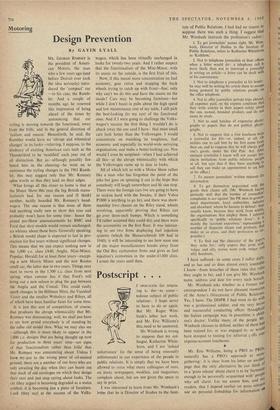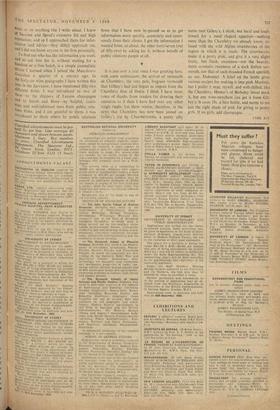Postscript . • •
I APOLOGISE for return- ing to the—to some— tedious subject of public relations: I hope. never to have to do so again. But Mr. Roger Wim- bush's letter last week, and Mr. Eric Williams's this, need to be answered.
Mr. Wimbush is wrong to suppose that my col- league, Katharine White- horn, and I are 'indeed unfortunate' (in the sense of being unusually unfortunate) in our experience of the people in public relations. It is simply that we have been allowed to voice what many colleagues of ours, on many newspapers, weeklies, and magazines, complain about, but are not given the space to say in print.
1 was interested to learn from Mr. Wimbush's litter that he is Director of Studies to the Insti- tute of Public Relations. I had had no reason to suppose there was such a thing. I suggest that Mr. Wimbush instructs the profession's cadets:, 1. To get journalists' names right. Mr. Wim" bush, Director of Studies to the Institute of Public Relations, refers to Katharine Whitehorn as 'Kathleen.'
2. Not to telephone journalists at their offices when a letter would do: a telephone call is more likely than not to interrupt a journalist in writing an article—a letter can be dealt with at his convenience.
3. Not to telephone a journalist at his home: he may well be writing his article there to escape being pestered by public relations people 011 the office telephone.
4. Not to offer journalists private trips abroad, all expenses paid, on the express condition that they write articles in their papers solely about the one, named, branded product, and do not name its rivals.
5. Not to send batches of expensive photo- graphs to papers that do not publish photo- graphs.
6. Not to suppose that a free luncheon buYs a journalist for life—or, indeed, at all. Or entitles one to call him by his first name from then on, and to suppose that he will always puff one's goods, under the Old Pals' Act. (One eminent journalist I know will not accept lull" cheon invitations from public relations people at all, but says that if they have anything to sell they can make an appointment to see him at his office.)
7. To answer journalists' written requests for information.
8. To get themselves acquainted with the goods their clients sell. (Mr. Wimbush knows perfectly well that the burden of journalists' complaints is not against 'the PR men in govern- ment departments, local authorities. industry and elsewhere' whom he hastens to defend : theY usually know, because they work from within, the organisations that employ them. 1 referred specifically to 'public relations firms': it is mainly the 'account executives,' representing a number of disparate clients and products, that make us so cross, and their profession so tur popular.) 9. To find out the character of the papers they write for: only papers that print arc",, vulgar and silly stories want arch, vulgar and silly handouts.
I have suffered—in some cases I suffer daily and so has and so does almost every journalist I know—from breaches of these rules (for rules they ought to be), and I can give Mr. Wimbush name, address and date for every such breach. Mr. Wimbush asks whether as a former war correspondent I do not have pleasant memories of the Army's Directorate of Public Relations. Yes, I have. The DDPR I had most to do with was a professional soldier, and my very brave and resourceful conducting officer throughout the Italian campaign was, in peacetime, 'a child- ren's doctor. Unlike many of the people Mr' Wimbush chooses to defend. neither of them had been trained for, or was engaged in, or would have stooped to touting for editorial riffs over expense-account luncheons.
Mr. Eric Williams. being a PRO to PR°s' naturally has a PRO's approach to news- gathering: it is clear from his letter on another, page that the only alternative he can think 01 to a 'press release' about claret is to be 'fortunate enough to be personally acquainted with' Peale who sell claret. Let me assure him, and 019 readers, that I depend neither on press releases nor on personal friendship for information 011 win of rep and 1 and hat dev Gri the Yea difi the an eolj tior int C, or on anything'else I write about. I knew Saccone and Speed's extensive list and high utation, and so I approached them for infer- Lion and advice-they didn't approach mc, I did not know anyone in the firm personally. -0 find out who has the information you want, I to ask him for it, without. waiting for a [(lout or a free lunch, is a simple journalistic ice I learned when I joined the Manchester ordian a quarter of a century ago. In forty-six wine paragraphs I have written this r in the Spectator, I have mentioned fifty-two erent firms. I was introduced to two of sc-to the shippers of Lanson champagne I to Smith and Hoey---by helpful, court- Is and well-informed men from public rela- Is firms, and I am grateful to them. I was -oduced to three others by public relations
firms that have now by-passed so as to get information more quickly, accurately and court- eously from their clients. i got the information I wanted from, or about, the other forty-seven (out of fifty-two) by asking for it. without benefit of public relations people at all.
It is just over a year since I was greeting here, with some enthusiasm, the arrival of vermouth tie Chambdry, the very pale, fragrant vermouth that Gilbey's had just begun to import from the Chambdry firm of Dolin. I think I have more votes of thanks from readers for drawing their attention to it than I have had over any other ingle tipple. Let them rejoice, therefore, in the news that Chambdry has now been joined on Gilbey's list by Chambdryzette, a pretty silly
name (not Gilbey's, I think, but local and tradi- tional) for a most elegant appetiser-nothing more than the Chambery we already know, in- fused with the wild Alpine. strawberries of the region in which it is made. The strawberries make it a pretty pink, and give it a very slight fruity, but fresh, sweetness-not the heavier, more aromatic sweetness of a dark Italian ver- mouth, nor that of such branded French aperitifs as, say, Dubonnet. A label on the bottle gives various recipes for making it into pink Martinis, but I prefer it neat, myself, and well-chilled, like the Chambdry. Hunter's of Berkeley Street stock it, but any wine-merchant can get it from Gil- bey's. It costs 18s. a litre bottle, and seems to me just the right shade of pink for giving to pretty girls. If no girls, add champagne.
(NMI. RAY















































 Previous page
Previous page